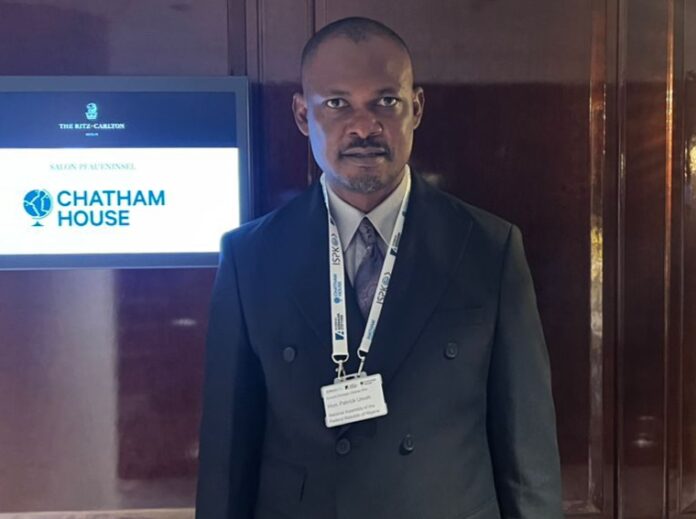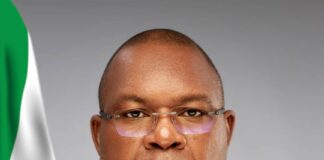Barr Patrick Umoh, at Chatham House.
Abasifreke Effiong
Nigeria’s federal lawmaker, Barr. Patrick Umoh, PhD, has sued for collaboration between Africa and Europe to reduce migration pressure.
Umoh who represents Ikot Ekpene/Essien Udim/Obot Akara federal constituency said collaborative investment in renewable energy, agriculture, and digital economies by Africa and Europe can mitigate migration pressures and foster economic stability.
The lawmaker stated this at Europe’s Strategic Choices Conference 2024 hosted by Chatham House in partnership with the Institute for Security Policy at the University of Kiel and Konrad-Adenauer-Stiftung, in Berlin, Germany on Tuesday 26th November.
Umoh, who is the Chairman, Committee on Monitoring, Evaluation and Implementation of Legislative Agenda in the House of Representatives spoke on the topic, “Europe’s Strategic Engagement with Africa: Security, Partnerships, and Shared Futures.”
He said migration and refugees flow from Africa are caused by instability, inequality and resource scarcity.
Umoh advocated proactive mediation in conflict zones, prioritising local ownership of peace processes and reinforcement of democratic norms by collaborating with African institutions and civil society.
READ FULL PRESENTATION BELOW.
Europe’s engagement with Africa stands at a pivotal moment, requiring a strategic realignment to address pressing challenges, counter competitive influences, and foster sustainable partnerships. As Africa’s geopolitical significance continues to rise, Europe must adopt an approach rooted in mutual respect, shared objectives, and African leadership to ensure regional and global stability.
To strengthen ties with the “Global South,” Europe must redefine its approach to official development assistance. This reimagining entails moving beyond the traditional donor-recipient relationship toward equitable partnerships that prioritise African-defined needs.
Health, education, and technology are critical areas where such collaboration can flourish. Innovative financing models, such as SUKUK (Islamic bonds), have proven effective in funding infrastructure and development projects, particularly in regions with predominantly Muslim populations, as they align with ethical finance principles and promote inclusivity.
Europe must also focus on fostering resilience and sustainability by investing in climate-resilient agriculture, renewable energy, and infrastructure to ensure long-term economic stability. Enhancing the capacity of African institutions, such as the African Union and regional blocs like ECOWAS, is essential for building effective mechanisms to address crises and promote stability.
The growing presence of China and Russia in Africa underscores the urgency for Europe to reinforce its role as a transparent and reliable partner. To achieve this, Europe should focus on fostering economic synergy by supporting African entrepreneurship, industrialisation, and infrastructure development. By enabling African nations to craft independent policy pathways, Europe can help them resist external coercion and preserve their sovereignty. Nigeria, as a regional powerhouse, presents a unique opportunity for partnership. Engaging Nigeria as a co-developer of governance and security solutions allows Europe to integrate its expertise with African innovation, creating sustainable frameworks that benefit both regions.
Africa’s security challenges, characterised by terrorism, military coups, and instability, demand a tailored and proactive European response. The resurgence of military regimes in West Africa threatens democratic governance, making it imperative for Europe to support frameworks that enhance civil-military relations and promote good governance. Capacity-building initiatives and diplomatic efforts can play a crucial role in encouraging peaceful transitions of power. To address the spread of terrorism and extremism, Europe must prioritise counterterrorism strategies that not only emphasise military cooperation but also address root causes such as poverty and disenfranchisement. Collaborative efforts in intelligence sharing, regional security force support, and socio-economic development will be central to these strategies. Building on its expertise, Europe can establish minilateral security arrangements in Africa that focus on shared goals, enhance multinational capacity, and empower local actors to lead long-term stabilisation efforts.
Migration and refugee flows, often driven by African instability, further highlight the interconnectedness of Europe’s and Africa’s futures. Europe’s response must include strengthening asylum systems, enhancing border management, and addressing the root causes of migration through targeted development aid and conflict resolution. By promoting human rights and safe, legal migration pathways, Europe can manage these flows more effectively while fostering resilience in African nations to reduce the pressures driving migration.
Europe’s longstanding experience in peacebuilding positions it as a key partner in fostering stability across Africa. Proactive mediation in conflict zones, coupled with prioritising local ownership of peace processes, can help de-escalate tensions and establish enduring solutions. Addressing the drivers of conflict, such as inequality and resource scarcity, through inclusive development programmes is equally critical. Reinforcing democratic norms by collaborating with African institutions and civil society can help embed governance practices that deter authoritarianism and political instability.
Nigeria serves as a prime example of how Europe can align with African leadership to achieve shared goals. As a leader in West Africa, Nigeria plays a crucial role in regional security efforts, such as its contributions to the Multinational Joint Task Force against Boko Haram. European support in the form of training, equipment, and intelligence sharing can enhance Nigeria’s counterterrorism capabilities and bolster regional security.
Furthermore, Nigeria’s democratic institutions represent a bulwark against the resurgence of military regimes. By engaging with Nigerian civil society and government, Europe can promote transparency, accountability, and democratic resilience, setting a standard for governance across the region.
Economic partnerships between Europe and Nigeria hold immense potential to address structural challenges. Collaborations in renewable energy, agriculture, and digital economies can mitigate migration pressures, foster economic stability, and create opportunities that counter external influences.
For Europe, the path forward requires a strategic engagement with Africa that evolves to meet the realities of a dynamic geopolitical landscape. By embracing equitable partnerships, countering competitive influences, advancing security cooperation, and leveraging the leadership of nations like Nigeria, Europe can co-create a future that ensures sustainable development and security for both continents. Through collaboration based on mutual respect and shared objectives, Europe and Africa can forge a path toward a more stable, prosperous, and inclusive global order.
MORE STORIES:
• Akwa Ibom lawmaker secures federal jobs for 16 constituents, donates N5m to women cooperative society
•Get justice for victims of homicide in Akwa Ibom State
















